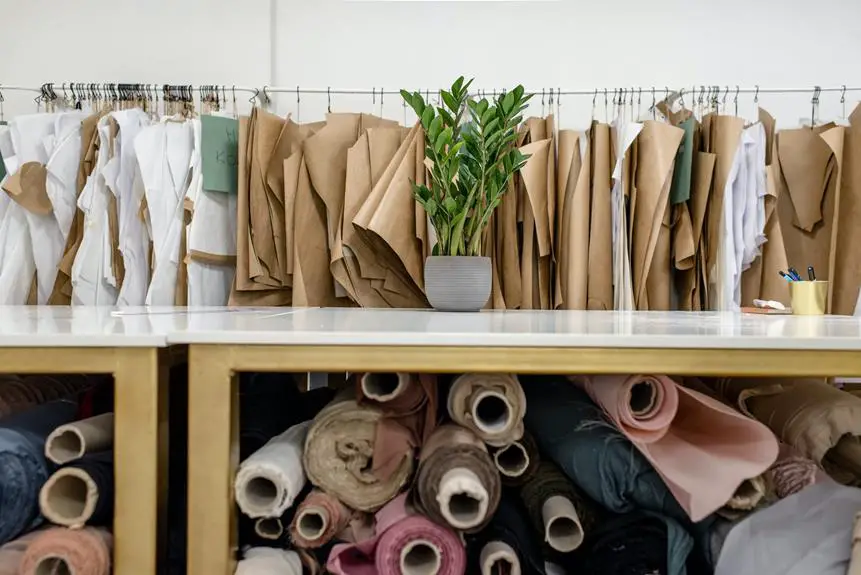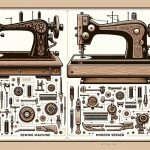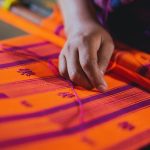If you're considering 24 thread for your fabric projects, you'll want to weigh the pros and cons to ensure it's the right choice.
This introduction will provide you with an objective overview of 24 thread, including its durability, versatility, and suitability for different fabrics.
By the end, you'll have a clearer understanding of whether 24 thread aligns with your specific project needs.
Key Takeaways
- 24 thread is a strong, medium-weight thread that is versatile and suitable for various sewing tasks.
- It is available in different types such as cotton, polyester, and a blend of both, with cotton 24 thread being ideal for natural fibers like cotton and linen, and polyester 24 thread being suitable for synthetic fabrics.
- Factors such as fabric compatibility, stitching techniques, and intended purpose influence the durability of 24 thread, and it can be enhanced with proper stitching techniques like backstitching or lockstitching.
- 24 thread is versatile and can be used with a wide range of fabric types, accommodating various sewing techniques like topstitching, quilting, and decorative stitching. It has high tensile strength for heavy-duty fabrics and projects, and is available in a wide range of colors for creative use.
What Is 24 Thread
24 thread is a type of sewing thread commonly used for fabric projects. It's a strong, medium-weight thread that's versatile and can be used for a variety of sewing tasks. There are different types of 24 thread, including cotton, polyester, and a blend of both.
Cotton 24 thread is great for natural fibers like cotton and linen, while polyester 24 thread is suitable for synthetic fabrics. The blend of cotton and polyester offers the benefits of both materials, making it a good choice for general sewing projects.
The best uses for 24 thread include garment construction, quilting, and general sewing on medium-weight fabrics. It's ideal for sewing seams, topstitching, and installing zippers. When working on quilting projects, 24 thread provides a good balance of strength and visibility.
It can withstand the wear and tear of daily use, making it suitable for constructing garments that require durability. Overall, 24 thread is a reliable choice for various fabric projects, offering strength and versatility.
Durability of 24 Thread
When considering the durability of 24 thread for your fabric projects, it's important to assess its ability to withstand regular use and maintain its integrity over time. The durability of 24 thread is influenced by various factors, including the type of fabric, stitching techniques, and the intended purpose of the project.
Here are some key points to consider:
- Fabric Compatibility: Certain fabrics may require a more durable thread to withstand frequent washing or high tension. Assess the compatibility of 24 thread with your specific fabric to ensure long-lasting results.
- Stitching Techniques: The durability of 24 thread can be enhanced through proper stitching techniques such as backstitching or lockstitching. Understanding the most suitable stitching methods for your project can significantly impact the thread's longevity.
- Tensile Strength: Evaluate the tensile strength of 24 thread to determine its ability to withstand tension and stress during regular use. This can help maintain the integrity of the fabric and prevent premature thread breakage.
- Maintenance Considerations: Proper care and maintenance of the fabric projects, including the use of 24 thread, can contribute to their long-term durability. Follow recommended cleaning and storage practices to preserve the integrity of the thread and fabric.
Assessing these factors will ensure that 24 thread meets the durability requirements for your fabric projects.
Versatility of 24 Thread
Assess the versatility of 24 thread for your fabric projects based on its compatibility with various fabrics and the range of stitching techniques it can accommodate. 24 thread is known for its versatility, making it suitable for a wide range of fabric types and sewing techniques. Whether you are working with cotton, denim, or even stretch fabrics, 24 thread is strong enough to handle the demands of different materials. Additionally, its compatibility with various sewing techniques such as topstitching, quilting, and decorative stitching adds to its versatility, making it a practical choice for diverse fabric projects.
| Strength | Color Options | Sewing Techniques |
|---|---|---|
| High tensile strength makes it suitable for heavy-duty fabrics and projects. | Available in a wide range of colors, allowing for creative and versatile use. | Accommodates various sewing techniques, including topstitching, quilting, and decorative stitching. |
With its strong tensile strength, wide array of color options, and compatibility with different sewing techniques, 24 thread provides the versatility needed for a variety of fabric projects. Whether you are a seasoned professional or a passionate hobbyist, the adaptability of 24 thread makes it a reliable choice for your sewing needs.
24 Thread for Different Fabrics
If you're considering different fabrics for your projects, you'll want to choose a thread that complements each fabric's unique characteristics and requirements. When selecting thread for different fabrics, consider the following:
- Thread Weight: Different fabrics require different thread weights. For lightweight fabrics like silk or chiffon, opt for finer threads like 50 or 60 weight. Heavier fabrics such as denim or canvas are best sewn with thicker threads like 24 or 30 weight for increased strength and durability.
- Fabric Compatibility: Ensure that the thread you choose is compatible with the fabric's properties. For stretchy fabrics like spandex or knits, use a thread with some stretch or give to prevent breakage in the seams. Similarly, delicate fabrics such as lace or tulle require a finer thread to avoid creating bulky or visible stitches.
Understanding the relationship between thread weight and fabric compatibility is crucial for achieving high-quality results in your sewing projects. Selecting the appropriate thread for different fabrics will ensure that your stitches are secure and that the finished product maintains its integrity.
Pros and Cons of 24 Thread
You can use 24 thread to achieve stronger and more durable seams in your fabric projects. The thickness of 24 thread provides excellent strength, making it a popular choice among sewers and quilters. However, there are both pros and cons to consider when using 24 thread for your fabric projects.
| Pros | Cons |
|---|---|
| Provides strong seams | May be too thick for delicate fabrics |
| Ideal for heavy-duty projects | Visible stitches on lightweight fabrics |
| Offers excellent durability | Limited color options |
| Suitable for quilting | Requires larger needles |
| Provides added strength to seams | May cause bulk in seams |
The 24 thread's strength and thickness make it ideal for heavy-duty projects and quilting, providing durable and strong seams. However, its thickness may not be suitable for delicate fabrics, and the visible stitches on lightweight fabrics can be a drawback. Additionally, the limited color options and the need for larger needles are factors to consider when using 24 thread for your fabric projects. Understanding the pros and cons of 24 thread will help you make an informed decision based on the specific requirements of your project.
Tips for Using 24 Thread
When using 24 thread for your fabric projects, consider adjusting your sewing machine's tension to accommodate the thicker thread. This adjustment can help prevent the thread from breaking or causing uneven stitches.
Additionally, employing the right stitching techniques can enhance the overall quality of your sewing projects. Here are some tips to help you make the most of using 24 thread:
- Thread Tension: Experiment with your sewing machine's tension settings to find the ideal balance for 24 thread. This may require some trial and error, but it's worth the effort for achieving smooth and consistent stitches.
- Stitching Techniques: When working with 24 thread, consider using longer stitch lengths to accommodate the thicker thread. This can help prevent the thread from getting caught or creating tension issues.
- Color Selection: Pay attention to the color of your 24 thread and how it complements your fabric. The right color choice can enhance the overall aesthetic of your project.
- Bobbin Winding: Ensure that the bobbin is evenly wound with 24 thread to avoid snags and tension problems during sewing.
Conclusion: Is 24 Thread Right for You?
Considering the versatility and strength of 24 thread, it proves to be a reliable choice for various fabric projects. When deciding if 24 thread is right for you, it's essential to weigh factors such as cost, alternative options, sewing machine compatibility, and project suitability. To help with this decision, here's a comparison of 24 thread with some alternative options:
| Criteria | 24 Thread | Cotton Thread |
|---|---|---|
| Cost | Affordable | Moderate |
| Strength | High | Moderate |
| Sewing Machine | Compatible with most | Compatible with all |
| Suitability for Projects | Versatile | Ideal for certain |
24 thread is cost-effective compared to some alternatives like cotton thread. It offers high strength, making it suitable for a wide range of fabric projects. Additionally, it is compatible with most sewing machines, providing flexibility for users. However, for specific projects where cotton thread is ideal, it may be a suitable alternative. Ultimately, the choice between 24 thread and other options depends on your specific project requirements and budget.
Frequently Asked Questions
Can 24 Thread Be Used for Embroidery Projects?
Yes, 24 thread can be used for embroidery projects. It's versatile for various embroidery techniques and offers a wide range of thread color choices. It's a good option for creating intricate designs on different types of fabric.
Is 24 Thread Suitable for Heavy-Duty Fabrics Like Denim or Canvas?
Yes, 24 thread is suitable for heavy-duty fabrics like denim or canvas. It's a strong, durable option for upholstery and leather crafting. Its thicker weight provides excellent strength and resilience for these types of projects.
Are There Any Special Considerations for Using 24 Thread With Stretchy or Delicate Fabrics?
When working with stretchy or delicate fabrics, it's essential to adjust thread tension accordingly. 24 thread can work well with these fabrics, but be mindful of compatibility and make necessary adjustments for optimal results.
Does 24 Thread Work Well for Quilting Projects?
Yes, 24 thread is suitable for quilting projects. Its thread weight is ideal for creating intricate quilt patterns. It provides a balanced stitching tension and enhances the overall appearance of your quilts, making them look professional and well-crafted.
Are There Any Specific Types of Needles or Sewing Machine Settings Recommended for Working With 24 Thread?
When working with 24 thread, consider using a size 70/10 or 80/12 needle for best results. Adjust your sewing machine's tension settings to accommodate the finer thread, ensuring smooth and even stitches.
- What Shirt to Wear With Tweed? - April 25, 2024
- Can You Bleach Tweed? - April 25, 2024
- How Do You Soften a Tweed Jacket? - April 25, 2024





